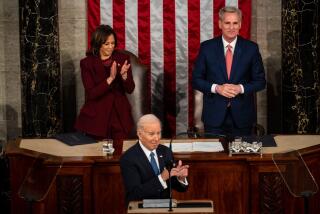If You Think Taxes Are a Pain Now ...
- Share via
Complaining about taxes is a national passion this time of year. Anti-tax groups stage protests. Even big-government liberals grouse about how they were socked by the alternative minimum tax.
Well, you ain’t seen nothin’ yet.
I’m looking through the Congressional Budget Office’s crystal ball into the future, and what I see is scarier than Oz’s Wicked Witch. If federal spending follows its historical pattern of the last 40 years, by 2050, the government would spend almost one-third of our gross domestic product -- not counting interest on the debt. (Government spending would explode mainly because the baby boomers will retire and healthcare costs will keep rising, which would swell the costs of the government’s Medicare and Medicaid programs.) By comparison, in 2004, the federal government raised about 16% of GDP in taxes -- half as much as we would need under this scenario.
To balance the budget under the CBO’s innocently named “Scenario 1,” all taxes would have to double. The average income tax bill would increase by almost $7,000 at today’s income levels. And that’s only the start.
Imagine losing twice as much of your paycheck to Social Security and Medicare taxes, and twice as much to the excise taxes on beer, gas and wine. And if, despite these taxes, you managed to die with your nest egg intact, your estate might face a super-sized estate tax.
To cover all of the additional spending with income taxes alone, they’d have to more than triple from today’s levels. Tripling rates wouldn’t work because the top rate would be more than 100%.
To raise that much, the government would have to slash deductions and credits. (No deductions for kids, pensions, mortgage interest, state taxes or charity -- and no child credits.) Even then, rates would have to increase by at least 70%. The top income tax rate would soar to 59% (compared with 35% now). A family of four with an annual income of $75,000 would pay more than $16,000 in additional taxes.
You may be thinking, “We don’t have to balance the budget -- after all, we’re not coming close now.” The CBO looked hard at the “deficits don’t matter” scenario. That one’s even scarier. If tax revenues as a share of the economy return to their historical average and stay there, then the public debt would explode to almost four times the GDP by 2050. (That’s four times the record debt burden we accumulated during World War II.) The interest on that huge debt load would exceed all tax revenues. It simply wouldn’t work. Long before that, lenders would demand sharp cuts in spending and big increases in taxes. And they’d require interest rates far above today’s, a factor the CBO’s simulations left out.
Health spending might not grow as fast as projected, but if we continue running deficits, total government spending, including interest, would still soak up nearly one-third of the economy by 2050 under the CBO’s “Scenario 2.” Again, long before that point, lenders would start clamoring for fiscal restraint.
Large and growing tax bills, like the ones discussed above, would eviscerate the economy. Although there’s a lot of debate about how much current tax burdens hamper the economy, most economists would agree that 60% tax rates would discourage people from working and saving and lead to a flood of new, unproductive tax shelters. A vicious cycle would drag the economy into a sinkhole.
If we try to borrow our way out of the morass, the higher interest rates that could be expected as a result would stifle business investment and sales of such big-ticket items as homes and cars. As our economy sputters, investors in China and Japan (who buy most of our public debt now) may well find tastier investment opportunities closer to home. Even if they didn’t pull out, they would require higher interest rates, which would magnify our problems. Another scary vicious cycle.
How do we avoid this doomsday scenario? As the CBO notes, the only way is to reduce runaway spending. Most important, we need to figure out how to slow down out-of-control healthcare spending. Fixing Social Security would be great too, but that’s only a tiny part of our long-term budget nightmare.
Second, deficits do matter. Taming deficits now will make life easier for taxpayers in 2050 (especially if we can’t figure out how to rein in health spending).
The good news is that it’s not too late. A good place to start would be to cancel the president’s plans to make his tax cuts permanent until we get entitlement spending under control. Otherwise, our grandkids may be thinking some very uncharitable things about us at tax time.


